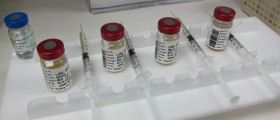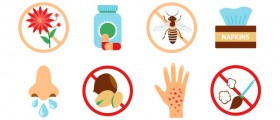
Drug allergy is the reaction of the immune system to a drug that is taken. It can occur with prescription and over-the-counter drugs and it can occur to people who have not previously had an allergic reaction to a particular drug. The most common signs of drug allergy are hives, fever and rash.
Not all reactions to a drug are necessarily allergic. Some are simply adverse or negative side effects of the drug and do not involve the immune system. Still, they can be dangerous too and it is required to stop taking the drug and to see a doctor whenever a reaction occurs, whether it is allergic or non-allergic.
Symptoms of drug allergy
Most allergic reactions start immediately after taking a drug. However, it is not impossible for the symptoms to start after several weeks of taking a drug.
The symptoms of drug allergy usually include skin rash, hives, fever, difficulty breathing, shortness of breath, swelling of the face, dizziness and, in severe cases, anaphylaxis.
Anaphylaxis is a rare but extremely dangerous and potentially life-threatening reaction. It starts minutes after taking oral drugs and it takes more time to start if using topical drugs. It is characterized by difficulty breathing, possibly leading to choking, due to the narrowing of the airways, shock with severe drop of blood pressure, weak and rapid pulse, vomiting, diarrhea, dizziness, lightheadedness and unconsciousness.
Anaphylaxis is a medical emergency and it can be fatal if not treated immediately.
Complications of drug allergy
Anaphylaxis is the most serious complication of drug allergy. It requires immediate medical attention in an emergency room or similar medical facility. Drug-induced anemia is another possible complication. It happens because the drug causes the immune system to destroy blood cells.
Serum sickness usually starts within two to four weeks of taking a drug. It leads to serious organ damage and it is characterized by skin rash, joint pain and fever.
If a person has an allergic or non-allergic reaction to a drug, he or she may have to switch to another, possibly less effective drug, or if there is no alternative, continue taking the drug and suffer the discomforting side effects.
Risk factors for drug allergy
Drug allergies are more common in children and elderly. They are also more common in people who have other allergies and who have already had drug allergies. taking drugs similar to the ones that caused allergies in the past will significantly increase the risk of a new reaction.
People with certain medical conditions, such as HIV/AIDS or conditions that alter the way in which the body processes drugs are at higher risk of having drug allergy.
- medlineplus.gov/ency/article/000819.htm
- medlineplus.gov/allergy.html
- Photo courtesy of Mk2010 by Wikimedia Commons: commons.wikimedia.org/wiki/File:Medication_potofen(Ibuprofen).JPG

















Your thoughts on this
Loading...